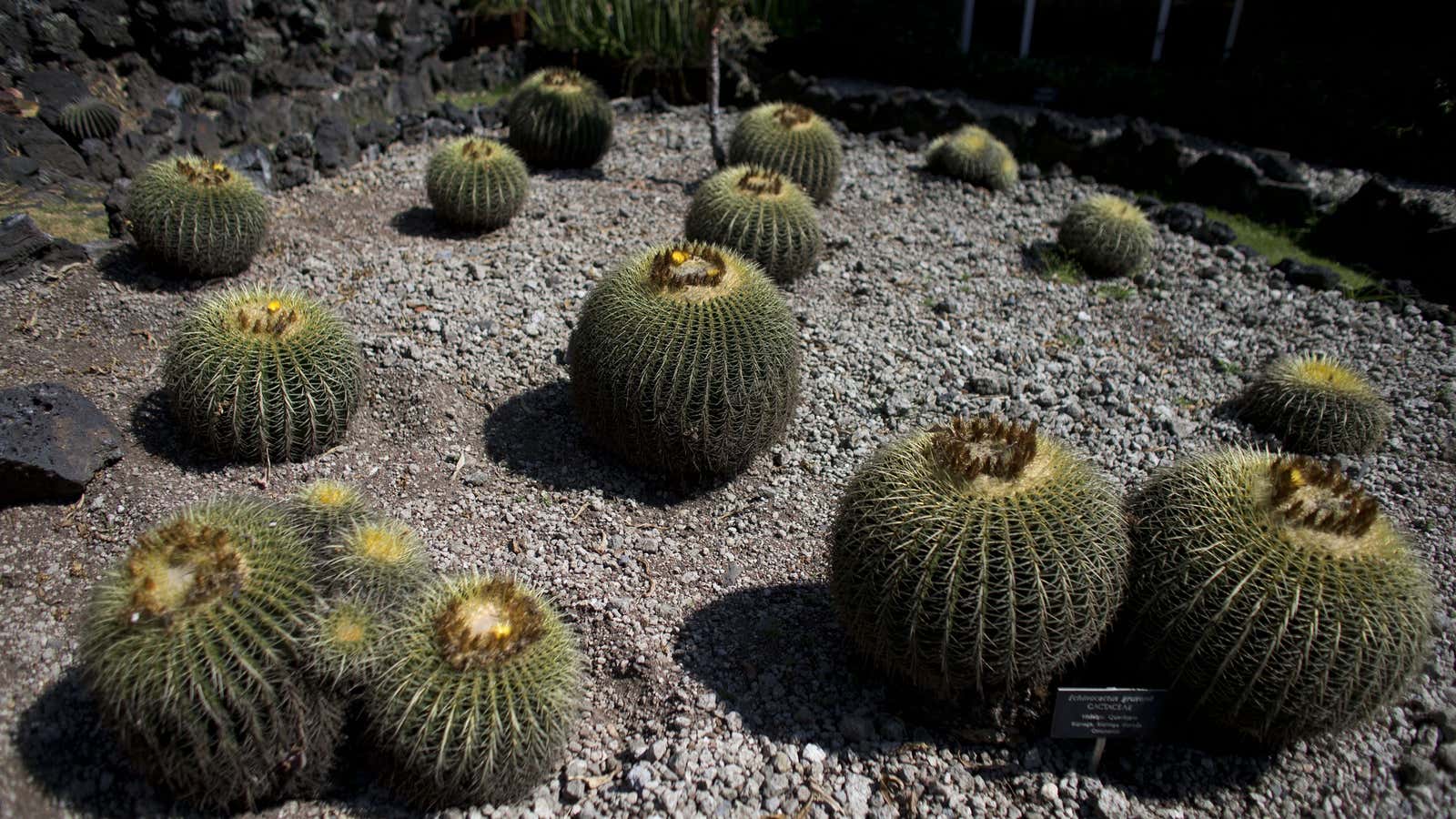Last month, Simon Andreas Langer and his girlfriend completed a month-long trip across the American Southwest. Now he’s facing federal smuggling charges for allegedly trying to take home endangered cactus seeds. The charge carries a potential prison term of up to 10 years.
Langer, who is from the Black Forest region of southern Germany, belongs to an avid community of cactus aficionados across Europe. He shares photos of sightings on a website focused on cacti and succulents, and keeps more than 200 cacti at home.
Langer had gone to the Leslie Canyon National Wildlife Refuge in Arizona to get a firsthand glimpse of the rare Coryphantha robbinsorum cactus, commonly known as the “Cochise Pincushion.” the US Fish and Wildlife Service put the species on the endangered list in 1986. Langer managed to photograph the Cochise Pincushion, as luck would have it, in Cochise County, Arizona, not far from the Mexican border.
From there, Langer and his girlfriend made their way to Colorado, camping out in national parks at night.
On June 24, according to court filings reviewed by Quartz, Langer and his partner arrived at Denver International Airport for an overnight flight to Zurich, Switzerland. They checked two bags. Officers from US Customs and Border Protection (CBP) and an agent from the US Fish and Wildlife Service took a look inside. They had been tipped off by a deputy sheriff who had seen Langer acting suspiciously near a stand of cacti a couple of weeks earlier.
In Langer’s suitcase, the agent found a white cardboard box. It had a “Route 66” logo embossed on the side, with a handwritten note taped to the top.
“CACTUS SEEDS—NO CITES 1 or U.S. FISH & WILDLIFE SEEDS OR PLANTS INSIDE!” it read, with a sketch of a Saguaro cactus underneath.
“CITES 1” refers to Appendix I of the Convention on International Trade in Endangered Species, a global treaty that has regulated the wildlife trade since 1975. CITES Appendix I lists species that are most endangered. The Cochise Pincushion, which is threatened, is listed in CITES Appendix II. Possessing these kinds of seeds without a permit is illegal.
Inside, the agent found 111 glassine envelopes, each containing cactus seeds. Each envelope had the name of a cactus genus written on the front. At least one of the envelopes contained seeds listed as endangered, and no fewer than six contained threatened seeds listed in CITES Appendix II.
In a scene you might expect to unfold around international criminals, and maybe not plant collectors, Langer and his girlfriend were intercepted on the jetway just as they were about to get on their flight. Langer at first denied knowing it was illegal to have the seeds, but the girlfriend, who feared being charged as an accomplice, told cops Langer knew full well he was breaking the law.
Loving plants to death
Plant poaching isn’t new, but it’s a growing problem in the United States as a new appreciation for plants—particularly cacti and succulents—turn public lands into potentially illicit payouts. The National Park Service is now injecting GPS trackers into Arizona’s famous saguaro cacti to catch people who carry off the ancient, slow-growing giants. They can sell for about $100 per foot of height on the black market, according to the Guardian.
Wild ginseng and other protected plants considered medicinal are also regularly poached from state and federal lands. Ginseng poaching is a particular problem along the Blue Ridge Parkway and in Shenandoah National Park, both in Virginia, and from Great Smoky Mountains National Park in North Carolina and Tennessee. The National Parks Service has dedicated efforts to monitor desirable plants and catch poachers.
In May, a man was sentenced to two years in prison for poaching more than 500 federally protected cacti from around California’s Lake Mead National Recreation Area. He sold the plants online over a period of four years to buyers in more than 20 countries.
Last year, authorities seized nearly 664 pounds of succulents poached from state parks in Northern California. They estimated the haul to be worth more than $600,000. Three men from South Korea were charged last month with conspiracy to smuggle the plants back to Asia, where they would be sold on the black market.
“I’d call it a poaching trend,” Patrick Foy of the California Department of Fish and Wildlife told the New Yorker. He began to see cactus and succulent poaching along the California coast starting in 2017. “They harvest the plants, process everything in a hotel room, oftentimes, and ship them back to nurseries in Korea and China.”
Langer said he was driven to commit his crime by—in his own words—a collector’s desire to have something no one else had. He told the US Fish & Wildlife Service agent that “nobody in Germany” has living examples of the Cochise Pincushion.
Langer’s modus operandi, from beginning to end, didn’t impress one longtime investigator, who has worked on everything from international drug trafficking cases to white collar criminal investigations.
“A rookie,” former FBI agent Dennis Franks told Quartz, pointing to the highly unconvincing note taped to the outside of Langer’s box. “Most professionals would go out of their way not to bring any attention to the package at all. Amateurish at best.”
Langer’s passport was confiscated, pending resolution of the case. He is free on $5,000 bond.
Read the full text of the Langer complaint here:
